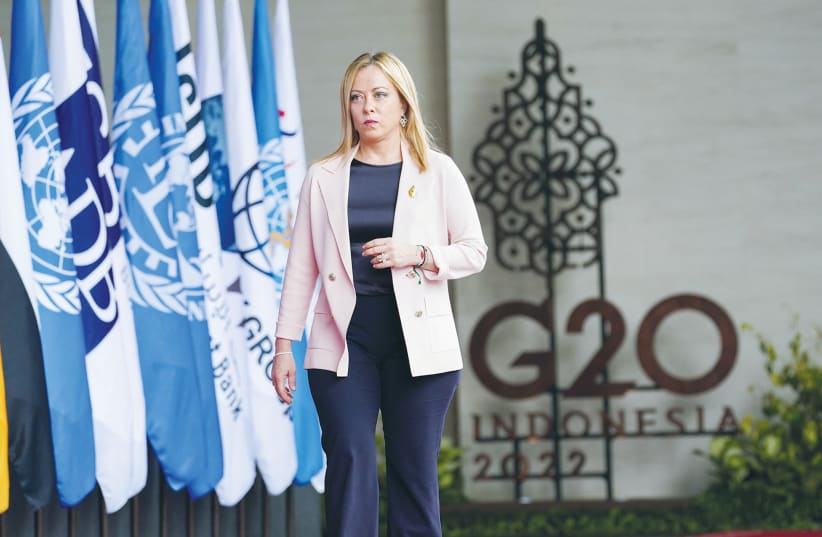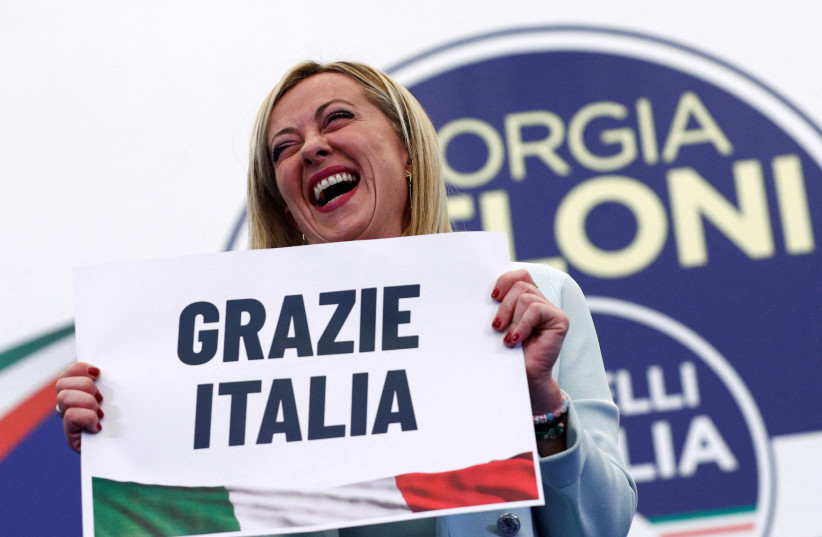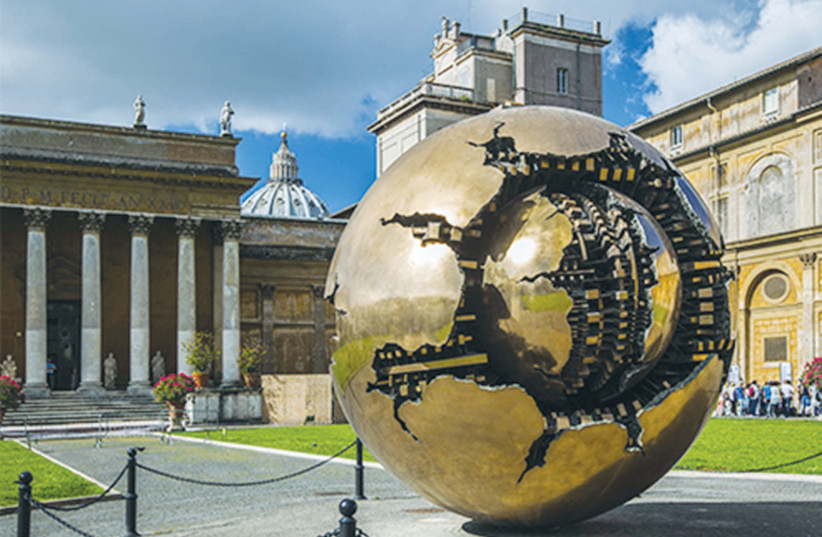Rome and Jerusalem – perhaps no other pairing of capitals conjures up more history, grandeur, conflict, apocalypticism and simple, raw emotion.
The modern Western world would not exist as we know it today without the meeting and clash of these two capital’s respective societies and cultures.
It would result in the formation and rise of Christianity and Christendom, “Judeo-Christian” values, biblical inspiration and aspiration, the political history and order of Europe (as all its major royal houses would claim descent, and by extension legitimacy, from the House of David) and much more.
Jerusalem and Rome also ultimately serve as an example of reconciliation, partnership and mutual respect.
As such, modern-day Italy, more than any other country on earth, save Iraq (as the modern geographic iteration of what was once the non-Arab Kingdom of Babylon and eventually the Babylonian Empire), has a particular historic responsibility to move its embassy to the Nation of Israel’s 3,000-year-old capital.
Italy and her people traditionally view themselves as heirs to Ancient Rome, and today, as in antiquity, a united Italy’s capital is located in the same city from which the Roman Republic and Empire took their name.
That historic responsibility is an enduring legacy of the Roman Empire’s conquest and occupation of the Land of Israel. After more than a century of imperial Roman occupation and rule, both directly and by collaborationist proxies, a massive rebellion by the Nation of Israel, a full-scale war, erupted in 66 CE.
Not only had Jerusalem been brutally subjugated, pillaged and desecrated in the years leading up to 66 CE, the climax of the war in 70 CE would see the city’s besiegement – after it was liberated by Judean forces earlier in the conflict – and ultimately its destruction along with the Second Temple at its heart.
The treasures, records and sacred vessels of the Temple that were not outright destroyed were looted and sent back to Rome along with countless of our enslaved ancestors.
Part of the looted treasures, along with the blood and sweat of those enslaved, would be used to finance and build the very symbol of Rome to this day – the Colosseum (along with numerous other landmarks in the city).
Will the relationship between Rome and Jerusalem mimick our ancestors?
Those Temple vessels and treasures that were not melted down and used for their monetary value, would be displayed as relics of a great and renowned nation subjugated and destined to disappear by the Roman Empire, in a purpose-built building, sardonically and ironically named the Temple of Peace, financed again with plunder from that very nation – Israel.
In two subsequent major wars between the Roman Empire and the Nation of Israel – along with countless smaller scale revolts throughout the period of Rome’s occupation of the Land of Israel and the surrounding region – many more would be exiled, enslaved and killed by Rome.
At the end of the third and final war, better known as the Bar-Kochba War, one that saw Rome threatened with a defeat as had not been witnessed since its transformation into an empire, Emperor Hadrian would implement additional persecutory policies against the Nation of Israel.
Jerusalem would be officially renamed in his honor as Aelia Capitolina, the entire Land of Israel renamed Syria-Palaestina, and Jews would be barred from even entering Jerusalem. The attempt to sever even the most innate ties between nation and land would have devastating effects on the Nation of Israel from that point on, and still affects the modern Middle East’s geopolitical landscape.
It would therefore be the ultimate expression of historic justice and truth for the Italian Republic to have its embassy in Israel relocated to our eternal capital, Jerusalem.
Conversely, it would also be a reflection of the intimacy, mutual respect and productiveness of modern Israeli-Italian relations, not just on the state-to-state level but on the people-to-people level.
Israelis love Italy, the food, the culture, the diverse locales throughout the country and it is one of the top tourist destinations for Israelis. Italian brands from Alfa Romeo to Gucci are wildly popular in Israel.
More and more Italians visit Israel not just to make religious pilgrimage, but to explore the country’s culture, nightlife and now world-class cuisine; a fellow Mediterranean nation using many similar ingredients in such a different way.
Both nations, at home, and in our respective substantial diasporas (which are often concentrated in the same cities and even neighborhoods, especially in North America), are very conscious of the fact that family, ethnic identity and faith, play similarly outsized roles in our day to day lives. As a result, it is easy for our nations to identify with, as well as feel comfortable with one another.
On the state level, Israel’s military, intelligence and technological prowess are more and more important to Italy’s national defense and security strategies and policies.
Cooperation in all those fields, and more recently the potential for cooperation in the energy sector, with Israel’s natural gas discoveries, serve to strengthen the bilateral state-to-state relationship.
Now there is also a new Italian government, led by Prime Minister Giorgia Meloni, which is composed of many Israel supporters and advocates. The prime minister has expressed her interest in deepening ties with Israel, which she has described as the only “fully fledged democracy” in the Middle East, and whose existence, she made clear, is vital.
As a right-wing leader with a conservative ideology, Meloni, along with her like-minded coalition partners, prioritize national sovereignty and the preservation and strengthening of the nation-state model as a fundamental part of the world order.
Identity politics at hand
Defending national heritage, and strengthening national identity in the face of multiculturalism and the identity politics pervasive throughout the Left in the West, are all part and parcel of these efforts.
Meloni and her partners, such as Deputy Prime Minister Matteo Salvini, see Israel as a prime example of a proud Western nation-state, with a clear and strong identity, which exercises its sovereignty and independence in a Western world dominated by post-modern and post-national, multilateralist paradigms. Israel is therefore a role model in their eyes, and a nation to be respected and admired.
Benjamin Netanyahu, expected to soon be back at the helm of Israel’s government, recognized this phenomenon among governments in the West run by the Right, and specifically the overlap between the European Right’s interests and worldview and the State of Israel’s fundamental interests and position in the global geopolitical arena.
A Netanyahu-led government working directly with the Meloni government would make a potential embassy move all the more possible. Moving the Italian embassy would also serve to dispel, perhaps for good, any lingering discomfort among some about the past association of Prime Minister Meloni’s political party, the Brothers of Italy, with certain antisemitic elements.
With history to be both rectified and made, and the current Italian government’s world view ostensibly in sync with such a move, the moment should be seized and the Italian Embassy in Israel should be moved to where it always belonged – to the city known to the Roman Empire already in its time as the Nation of Israel’s ancient capital Jerusalem.
The writer is an Israeli hi-tech entrepreneur and a member of the Israel Leadership Forum. He is involved with various Israel advocacy causes including working with Christian Zionist and pro-Israel Noahide groups.


